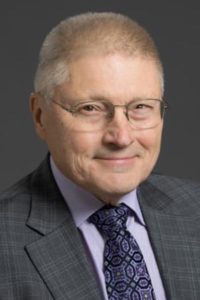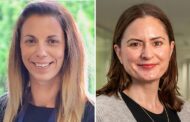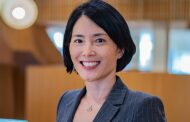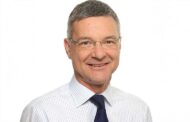
Philip D. Bonomi, MD
ILCN: How did you decide on a career in oncology?
Dr. Bonomi: I wanted to do something to help people. I liked science, especially chemistry, and thought I could be a physician.
During my residency at Geisinger Medical Center, Chuck Murray, MD, an endocrinologist who went on to become an oncologist, became my role model. He was empathetic and smart. He taught me about oncology, focusing primarily on breast cancer.
I also worked with Howard Sky-Peck, PhD, during medical school. He was the Chairman of Biochemistry at Rush at one point. He was doing cancer research in relation to estrogen receptors and breast cancer. Drs. Murray and Sky-Peck certainly influenced my decision to become an oncologist.
ILCN: How does the training doctors receive today differ from the training you received?
Dr. Bonomi: There is so much more to know now. It’s wonderful because increased knowledge and multiple new treatment options enable us to help many more patients now.
I tell oncology fellows that it’s wonderful that they have so many ways to help cancer patients now. However, it also means that they must devote a great deal of time to stay abreast of rapidly accumulating new information. New treatments and insights into cancer biology were developing slowly when I completed my oncology fellowship.
There are so many tremendous advances throughout medicine—sequencing the human genome and all the discoveries that have come about because of that breakthrough, for example. We also have new local therapies, including minimally invasive surgeries, stereotactic radiation, plus new imaging techniques including PET scans and more sophisticated CT and MRI scans.
In addition to these changes, more doctors are choosing to subspecialize. When I completed my oncology fellowship, I took care of all kinds of cancer patients. The days of the general oncologist are dwindling fast. Now increasing numbers of oncologists are focusing on one type of cancer.
ILCN: What are some of the biggest changes that you’ve had to adjust to in the profession during the past 50 years?
Dr. Bonomi: I’ve had to adjust to increasing discoveries and the rapid dissemination of information. The electronic medical record has been an exceptionally valuable tool, but it’s still a mixed blessing. It’s increased our workload tremendously. There’s so much time spent outside of the clinic completing documentation.
The other thing about the electronic medical record is that it’s a gold mine that we’re not able to mine. We are not able to easily retrieve information from it. So, the challenge is, how do we use it more effectively for outcome measures, quality measures, and research? Seeing notes from physicians and other institutions is a major benefit, but we still cannot see images without requesting the image files from other institutions.
ILCN: Will you continue your research after you retire?
Dr. Bonomi: Late in my career, I’ve become very interested in cancer cachexia, which is, unfortunately, a problem that many cancer patients face. It’s driven by inflammation, which is the body’s attempt to prevent the cancer from growing.
Unfortunately, it doesn’t prevent cancer growth. However, it does cause loss of appetite and the breakdown of muscle and fat. As a result, cancer patients experience weakness and fatigue.
It’s a major problem for many advanced cancer patients. They want to eat, but they can’t. Intestinal motility slows down, and food no longer tastes good. Mouth dryness occurs because decreased saliva production occurs. All these symptoms make eating difficult and results in emotional distress for patients and their families.
Rush researchers are participating in clinical testing of new treatments that could reverse cachexia and improve appetite and reverse weight loss.
Under the leadership of Jeff Borgia, PhD, the Rush team is trying to identify the mediators of cancer cachexia and develop new ways to treat this problem. We believe that successful treatment of cancer cachexia could prolong cancer patients’ lives, reduce some side effects from chemotherapy, and increase effectiveness of immunotherapy.
After I retire, I want to continue to work on cachexia research with the team of physicians at Rush. At the moment, our team is focused on lung cancer, but findings from cachexia research could apply to all cancer patients. We are collaborating with two pharmaceutical companies that are studying cancer cachexia and are developing new treatments for this problem.
ILCN: What has been the most rewarding part of your career as an oncologist?
Dr. Bonomi: The most rewarding part of my career has been seeing the advances that have been made in lung cancer. The discovery of therapies that target specific mutations that occur in lung cancer has been a huge advancement and has helped many patients. However, the biggest advancement has been the discovery of immune checkpoints inhibitors that result in prolonged remissions for a relatively large number of patients who have advanced incurable lung cancer. Rush researchers participated in the pivotal clinical trial that led to the first US Food and Drug Administration approval of pembrolizumab for the treatment of advanced stage lung cancer patients.
Participation in our lung cancer and gynecologic cancer multidisciplinary clinics has been very gratifying for me. In our multidisciplinary clinics, the majority of patients are able to get a comprehensive assessment of their condition and discussion of their treatment options in a single visit. The opportunity for me to be a part of the Rush multidisciplinary teams and to benefit from the collaborative spirit at Rush is a major reason for my spending all of my 47-year career at Rush.
Through our multidisciplinary care, we have improved patient care, especially in lung cancer. Rush physicians were among the first in the world to show that chest radiation and simultaneous chemotherapy was safe and effective in stage III lung cancer patients and that surgery is feasible for some of these patients. This treatment strategy eventually became the standard of care for stage III lung cancer patients and still is today.
ILCN: You are known as one of the most beloved physicians at Rush. How do you build that level of trust with your patients?
Dr. Bonomi: The biggest thing I learned from one of my mentors, Robert Slayton, MD, is that the most important thing we do as physicians is to listen to people and talk with them. The other was from Charles Perlia, MD, who asked me early in my career, “So, what are we trying to do here?” I responded, “We’re trying to figure out how to treat cancer and to find new treatments.” He said, “No, we’re trying to prolong meaningful life and relieve suffering.” That became my mission statement.
I have also tried to remain accessible to my patients. Being accessible doesn’t mean just getting them in the door the first time. It means being accessible throughout the course of their illness. If they call, text, or send a MyChart message, they’ll get a response from me or another member of their Rush care team. Being accessible is important to me, and I think that has helped to build relationships and trust with my patients.
ILCN: What are some of the advances that you think will have the biggest impact on patient care during the next decade?
Dr. Bonomi: I think immunotherapy is the biggest breakthrough. Currently, immunotherapy has made a significant impact for patients with multiple types of cancer.
Improved screening for lung cancer will also be very important. Lung cancer screening is gaining momentum and is starting to reduce lung cancer mortality. Mammograms and more effective treatments for breast cancer have reduced mortality in this disease, and I believe that we are on the verge of a similar trend in lung cancer.
It is also important to point out that the number of new treatments approved by the FDA in the past 10 to 15 years for lung cancer patients and for patients with other cancers has increased almost exponentially. I believe this positive trend will continue.
ILCN: What are your plans after retirement?
Dr. Bonomi: After I retire, I plan on spending more time with my wife, kids, and grandkids. I will garden, ride my bike, play golf more and travel. It has been a privilege to work at Rush all these years, and I am very grateful for that opportunity. There is also some sadness. I will miss my patients, their families, my colleagues, and the Rush collaborative culture.





